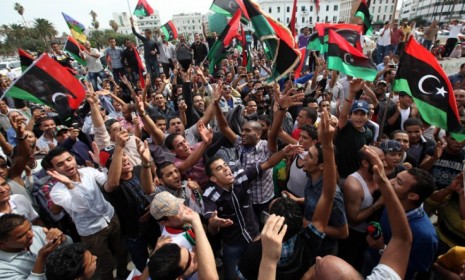What's next for Libya: 4 theories
For Libyans, Moammar Gadhafi's bloody death marks the end of a 42-year era of repression. Will the future be better?

A free daily email with the biggest news stories of the day – and the best features from TheWeek.com
You are now subscribed
Your newsletter sign-up was successful
Libya celebrated the capture and death of longtime ruler Moammar Gadhafi with gunfire and jubilation on Thursday. But when the sun finally rose on a Gadhafi-free society on Friday, lots of questions faced the National Transitional Council (NTC), Libya's many tribes, and even Libya's neighbors. "Libya will travel a long and winding road to full democracy," President Obama said Thursday. But nobody is sure how long or winding the road will be, or if it will really end in democracy. Here, four theories on what's next for Libya:
1. Libya can now build a democracy
Gadhafi's death is "a highly valuable prize" that should deflate the loyalist resistance and "trigger the formal transition period... to democratic elections and a new constitution," says Stefan Wolff in Reuters. Libyans, possibly for the first time ever, have a real shot to determine the kind of country they want to live in, making Gadhafi's overthrow "the only successful uprising of the Arab Spring to date." Thankfully, says The Washington Post in an editorial, the NTC used the past few months to prepare "an ambitious but reasonable transition plan," and Libya has the oil wealth to make it work.
The Week
Escape your echo chamber. Get the facts behind the news, plus analysis from multiple perspectives.

Sign up for The Week's Free Newsletters
From our morning news briefing to a weekly Good News Newsletter, get the best of The Week delivered directly to your inbox.
From our morning news briefing to a weekly Good News Newsletter, get the best of The Week delivered directly to your inbox.
2. Libya will descend into civil war
Without hatred of Gadhafi to hold it together, "I'm afraid the opposition is going to start fighting among themselves now," American Enterprise Institute scholar Michael Rubin tells USA Today. "I'm afraid it's going to be a far bloodier period in Libya." There are lots of tribal and ethnic divisions, but Libya's biggest threat now is the East-West rivalry, says Peter Gelling in Salon. The Benghazi-based Eastern fighters "claim to be the real heroes" because they started the uprising, but the Misrata-based Western faction won the bloodiest battles. They've already been jostling for power, and they all have guns. "The Libyan conflict may be far from over."
3. We've helped create an Islamist enemy
The "most problematic" fallout from Gadhafi's death, says Ed Husain at the Council on Foreign Relations, is "the emergence of Islamist extremist and Salafist hardliners from within the ranks of the Libyan rebels." Islamist groups have been the biggest winner elsewhere in the Arab uprisings, and they may not welcome a secular government. We're looking at Gadhafi being replaced by a "straight Sharia regime populated by al Qaeda elements," says Robert Spencer in Jihad Watch. The new America-backed regime will end up "being even more anti-American" than Gadhafi was.
A free daily email with the biggest news stories of the day – and the best features from TheWeek.com
4. This will reignite the Arab Spring
The humiliating death of the region's longest-reigning dictator "will provide a fillip for those who seek to build democracy and the rule of law elsewhere" in the Arab world, says The Economist. Neighboring Egypt and Tunisia are on a rocky path to holding Arab Spring–seeded elections, and Syrians are bravely standing up to Bashar al-Assad. Gadhafi's demise will give them all "a big boost." The gruesome end to Africa's self-annointed "King of Kings" will certainly "unnerve rulers and energize pro-democracy forces," says Paul Koring in The Globe and Mail. But if it leads the despots to fight harder to retain power, the Arab Spring might turn into a bloody winter.
-
 What is the endgame in the DHS shutdown?
What is the endgame in the DHS shutdown?Today’s Big Question Democrats want to rein in ICE’s immigration crackdown
-
 ‘Poor time management isn’t just an inconvenience’
‘Poor time management isn’t just an inconvenience’Instant Opinion Opinion, comment and editorials of the day
-
 Bad Bunny’s Super Bowl: A win for unity
Bad Bunny’s Super Bowl: A win for unityFeature The global superstar's halftime show was a celebration for everyone to enjoy